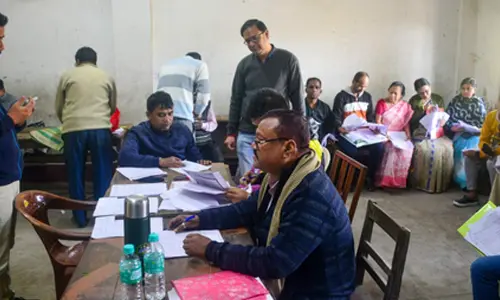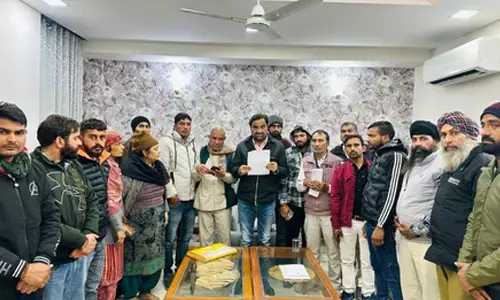Curbs on junk foods in schools

Curbs on junk foods in schools.For schools in Delhi, the court has asked the administrator, Delhi, to consider issuing directions under Rule 43 of the Delhi School Education Rules, 1973 to follow the guidelines and ensure their compliance.
Delhi High Court judgement is a milestone in addressing growing burden of obesity, diabetes and heart disease
We welcome the Delhi High Court order in the junk food case, in which it has directed strict implementation of the guidelines for making available wholesome, nutritious, safe and hygienic food to school children in India. We would have liked a complete ban on the sale of junk food in schools, but what the Court has ordered is also very significant: restriction is an important step in recognition of the fact that this kind of food is bad for children, and must not be allowed in schools.
- Sunita Narain, Director-General, Centre for Science and Environment (CSE)
orders on compliance
For schools in Delhi, the court has asked the administrator, Delhi, to consider issuing directions under Rule 43 of the Delhi School Education Rules, 1973 to follow the guidelines and ensure their compliance. The Court has suggested not waiting for regulations or directions from the food authority and taking necessary action by the end of April 2015. For schools outside Delhi and those affiliated to Central Board of Secondary Education (CBSE), the Court has directed the Central Board of Secondary Education (CBSE) to consider this issue, take a decision on it and, if possible, see if it can include adherence to the guidelines or similar directions as a condition for affiliation or continued affiliation of the schools with CBSE.

What the guidelines recommend?
Most common junk foods that are high in fat, salt and sugar such as chips, fried foods, sugar sweetened carbonated beverages, sugar sweetened non-carbonated beverages, ready-to-eat noodles, pizzas, burgers, potato fries and confectionery items should be restricted in schools and 50 meters nearby.Advertisement and promotion of such foods targeted at children is to be regulated through a framework that includes all types of media, celebrity endorsements and promotional activities.
Formulate a canteen policy
A canteen policy should be implemented, based on colour coding. Green category foods—the healthy food options—should constitute about 80 per cent of available foods. Red category of select most common junk foods that are high in fat, salt and sugar should not be sold or served in schools. Suggests healthy menu options should include fruit salad, fruits, paneer / vegetable cutlets, khandvi, poha, uthapam, upma, idlis and kathi rolls, low-fat milk shakes with seasonal fruits and no added sugar, fresh fruit juice and smoothies with fruits, fresh lime soda, almond milk and lassi. FSSAI should fix limits of unhealthy ingredients such as transfats to 5 per cent at the earliest.
Promote best food awareness in schools
Schools should promote nutrition education and awareness among children. A well-structured curriculum on balanced diet and its health impacts should be introduced. Labelling regulations must be strengthened by FSSAI to enable complete and transparent information on the amount of fat, salt and sugar with reference to recommended daily allowed limits.
Chips, fried foods, carbonated beverages and pizzas may no longer be available in school canteens and within its vicinity in the national capital, with the Delhi High Court directing the food safety authority to enforce guidelines on restricting sale of junk food in and around schools.Under the guidelines, food high in fat, salt and sugar (HFSS) cannot be sold within 50 metres of school premises.The Delhi High Court has asked the Food Safety and Standards Authority of India (FSSAI) to create regulations and implement them within three months. The court also directed the Delhi government and the Central Board of Secondary Education (CBSE) to consider issuing directions to schools to implement the guidelines even before the FSSAI frames rules under the Food Safety and Standards Act.
The draft guidelines, which were submitted to the court last year, include measures such as restriction/limit on the the availability of most common “High Fat, Sugar and Salt (HFSS) foods” — chips, burgers and aerated drinks — in schools and area within 50 metres of schools. The order was passed on a public interest petition that had sought complete ban on sale of such food items in and around schools.
But the Centre for Science and Environment (CSE) has said the judgement of the Delhi High Court is very significant as it amounts to recognition of the link between unhealthy food and growing incidence of obesity and non-communicable diseases. “We welcome the Delhi High Court order in the junk food case, in which it has directed strict implementation of the guidelines for making available wholesome, nutritious, safe and hygienic food to school children in India,” said Sunita Narain, Director-General, Centre for Science and Environment (CSE).
“We would have liked a complete ban on the sale of junk food in schools, but what the Court has ordered is also very significant: restriction is an important step in recognition of the fact that this kind of food is bad for children, and must not be allowed in schools,” Narain added. The court order is in response to a public interest petition of 2010, which sought a ban on sale of junk food inside and near school premises. In its order, the court directed the Food Safety and Standards Authority of India (FSSAI) to implement the guidelines for making available wholesome, nutritious, safe and hygienic food to school children in India. These guidelines were developed by a committee constituted by the FSSAI on court’s direction.
The guidelines provide a scientific background on how consumption of junk foods, high in fat, salt and sugar, is linked with growing incidence of obesity and non-communicable diseases such as diabetes and hypertension among children. Some of the key principles behind these guidelines are: “benefits of balanced, fresh and traditional food cannot be replaced”; “schools are not the right places for promoting foods high in fat, salt and sugar”; and “children are not the best judge of their food choices”.The court has directed that the guidelines be given the form of regulations or directions as per the Food Safety and Standards Act, 2006, within three months to enforce their implementation across the country.
Narain said: “The guidelines are scientific, comprehensive and well establish the harmful effects of junk foods. The essence throughout the document is to not allow the availability of such foods in schools. If well implemented, maintaining the spirit of it, the guidelines will help avoid the looming health crisis in this country.”
She added: “The court has emphasised on time-bound enforcement across the country and has put immense faith in FSSAI. It could prove to be a milestone development towards addressing the growing burden of obesity, diabetes and heart disease—among other non-communicable diseases—in the Indian context.” (Down To Earth)














